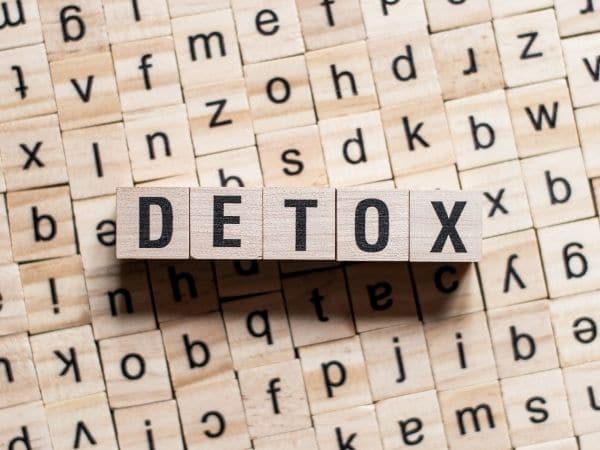Alcohol detox is a necessary part of recovering from alcohol addiction, but if you’ve been struggling with alcohol abuse for a period of time, we completely understand why you may feel scared or nervous about this treatment.
Continue reading to learn more about what happens during alcohol detox, and how you can expect to feel while receiving this treatment.
What Happens During Alcohol Detox?
Alcohol detox is the treatment for alcohol withdrawal, or physical dependence on alcohol. Detox is always the first stage of treatment for alcohol addiction and occurs before you receive any type of therapy in an alcohol rehab program.
Alcohol withdrawal affects everyone differently based on a variety of factors, including metabolism, health status, and the severity of dependence. There’s no way to predict exactly how any one person will respond to detox and withdrawal, though the nurses and doctors who oversee this treatment are highly experienced and trained to anticipate and treat symptoms as they occur.

Alcohol withdrawal symptoms usually begin within six to 24 hours after the last drink, peak at between 36 and 72 hours, and last for up to 10 days. The detox and withdrawal timeline is different for everyone.
Alcohol detox usually takes place in a comfortable residential or hospital-like environment where you can relax and take it easy for the duration of withdrawal. Some patients also receive medications to reduce certain symptoms. Nurses and doctors will monitor you closely during detox to detect and prevent potential complications, including seizures and extreme fluctuations in blood pressure and body temperature.
Which Symptoms Will I Experience from Alcohol Detox?
Alcohol withdrawal syndrome includes a variety of symptoms — all of which may vary in severity. The most common symptoms include:
— Nausea and vomiting
— Anxiety
— Nervousness
— Depression
— Mood swings and irritability
— Fatigue
— Excess sweating
— Shakiness and tremors, particularly in the hands
— Nightmares
— Insomnia
— Cloudy thoughts
— Diarrhea
— Dehydration
— Increased heart rate
— High blood pressure
Many of these symptoms are the same as those of the flu. You may feel extremely weak, ill, and tired as your body recovers. Dehydration is a potential complication of alcohol withdrawal due to vomiting, diarrhea, and excess sweating, though your nurses and doctors will provide you with plenty of water to ensure you stay hydrated.

Anxiety and depression can either be acute and last only for the duration of alcohol detox or linger for several weeks or months afterward. Mental health disorders that stem from alcohol dependence can be successfully treated and managed with dual diagnosis therapy in an alcohol rehab program.
Some people may experience a severe form of alcohol withdrawal called delirium tremens. Delirium tremens can occur when you suddenly stop drinking after a long period of heavy drinking and is most common among people who have been using alcohol for 10 years or longer.
Delirium tremens is a medical emergency that can lead to serious complications including death when symptoms are not managed properly. Research suggests that without appropriate treatment, the mortality rate for delirium tremens can be as high as 37%.
Symptoms of delirium tremens include:
— Delirium (severe confusion)
— Whole-body tremors
— Excitement or fear
— Hallucinations
— Sudden changes in mood
— Bursts of energy
— Changes in mental function
— Agitation and irritability
— Restlessness
— Deep sleep that lasts for at least one day
— Extreme sleepiness
— Sensitivity to light, touch, and sound
— Seizures
Can Medications Make My Symptoms Go Away?
Most alcohol detox facilities use medications to minimize your symptoms and make you feel as comfortable as possible during withdrawal. Medications may not completely eliminate all your symptoms, but they can definitely reduce their severity to help you feel better.
People with mild withdrawal symptoms will receive medications that treat only the symptoms they’re experiencing. For example, if you are experiencing only nausea, vomiting, and headache, you may be given prochlorperazine to reduce nausea and vomiting, and a pain reliever such as ibuprofen to treat your headache.

People with moderate to severe withdrawal symptoms will also be given medications that treat specific symptoms, as well as a benzodiazepine medication called diazepam.
Alcohol and benzodiazepines are central nervous system depressants that slow down nervous system functions including heart rate and breathing. Diazepam is a long-acting benzodiazepine that can help reduce the impact of alcohol withdrawal, as it can slow your heart rate, help you sleep more easily to combat insomnia, and also prevent seizures. Diazepam may be given to you every one to two hours or as often as needed to control your symptoms.
Will Symptoms Of Alcohol Withdrawal Ever Return After Detox?
Symptoms of alcohol withdrawal typically don’t return after detox unless you experience a relapse, start drinking regularly, become physically dependent, then abruptly stop drinking.
Alcohol detox helps your body heal and recover from the effects of heavy, long-term alcohol use. Alcohol interacts with a number of brain chemicals and can also change the physical structure and functioning of your brain. As a result, you may continue to experience lingering alcohol withdrawal symptoms (also known as post-acute withdrawal syndrome, or PAWS) for several months or years following detox.
Symptoms of PAWS are usually psychological and emotional rather than physical. It may take your brain chemicals a while to rebalance and adjust after being regularly exposed to alcohol. Depression, anxiety, cognitive problems, panic, and stress are among the most common psychological symptoms you may experience as part of PAWS.
If you continue suffering from PAWS symptoms after completing alcohol detox, your doctor can refer you to an addiction treatment center where you can receive dual-diagnosis therapy or medication management services. Dual diagnosis therapy can also help you learn to manage depression, anxiety, and other co-occurring mental health disorders after recovering from alcohol dependence. Medication management services often involve putting you on medications that help you stay abstinent from alcohol as you continue to recover from PAWS.
Alcohol Detox in Arizona
At Buena Vista Health and Recovery Centers, our goal is to make you feel as comfortable as possible as you recover from alcohol dependence. Our alcohol detox services involve the use of medications that can effectively relieve your symptoms. Visit our treatment center or call us today to learn more about our available detox services.

CAVE CREEK
(623) 323-1970
29858 N. Tatum Blvd.
Cave Creek, AZ 85331
CHANDLER
(480) 680-0606
3033 South Arizona Avenue
Chandler, Arizona 85248
TUCSON
(520) 436-7860
5151 East Pima Road
Tucson, Arizona 85712
SCOTTSDALE
(623) 323-7986
8171 E Indian Bend Rd
Scottsdale, AZ 85250





